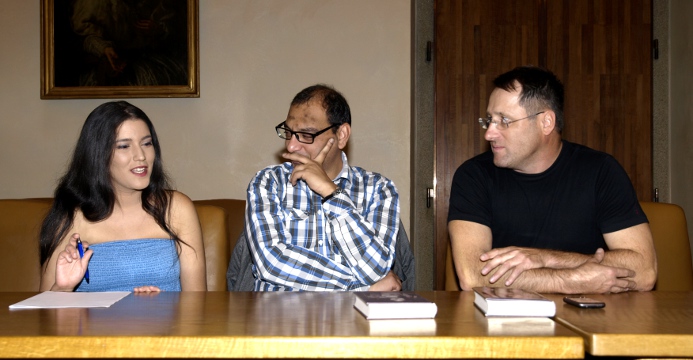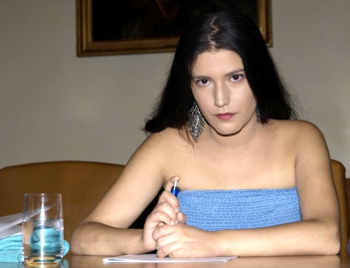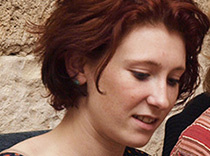Poppy Gerrard - Abbott - International iForum • foto: red. • 21 October 2013
Faculty of Humanities Introduces a Debut Author with Revolutionary Words – Meet Shani Boianjiu
Israeli writer Shani Boianjiu is no ordinary 25 year old. Born in Jerusalem and raised on the Israeli-Lebanese border where, she tells us, school would often be cancelled due to conflict. Today, she possesses a bestselling novel, Harvard degree, numerous literacy recognitions, and extensive experience in the Israeli military under her belt.

From left: Shani Boianjiu, Yasar Abu Ghosh and gender studies Professor Petr Pavlik
The talk, arranged by Charles University, Faculty of Humanities, celebrated and explored her first, critically acclaimed publication The People of Forever Are Not Afraid (2012), a coming-of-age narration of three small-town Israeli girls as they are enrolled into the army at eighteen. Their journeys invite us to an intimate, must-read account of women in the army; a matrix of conflict, danger, hierarchy, politics, sexism and unapologetic reality, dramatically contrasted with relatable, approachable themes of womanhood. Illuminated with the cutting, witty personality and deeply personal experiences of Boianjiu, it’s no wonder that her list of achievements are a bit of a mouthful. She’s a star on a global stage – her book will soon be published in 23 countries, with a Czech version already available, and has been personally translated by multilingual Boianjiu into English and Hebrew. She has successfully caught the eye of numerous book, magazine and web recommendations including The Wall Street Journal top 10 fiction titles in 2013 and The Algemeiner’s Jewish 100 (to name a couple). She’s the first Israeli and youngest author in 2013 to be longlisted for the UK’s Women’s Prize for Fiction, the youngest winner of the National Book Foundation’s Under 35 award, a finalist for the Sami Rohr Prize for Jewish Literature and a semi-finalist for the VCU Cabell First Novelist Award. Next stop: world domination.

Boianjiu stunned me with her overwhelmingly well-informed arguments, and she appeared much older than her age because of this.Along with the audience, the panellists quizzing Boianjiu were anthropologist Yasar Abu Ghosh and gender studies Professor Petr Pavlik, which brought up inevitably interesting questions and equally intriguing answers from Boianjiu. Throughout, her responses conveyed a worldly, humanist heart, especially in relation to nationality, politics and language: “the book crosses the borders of nationality, from a life of segregation” Boianjiu comments, “love is the only homeland. Alleviation of suffering is the only homeland, not language. In my art, I am free.” She spoke with determination, yet was surprisingly optimistic when we covered the topics of war, international peace and negotiation. She never “beat around the bush” either, and I instantly noted and admired this when we were introduced before the debate. It was somewhat relieving to conduct an interview on a variety of taboo issues in such an honest and raw manner, and I felt at ease asking her personal questions. For instance, in relation to her military experience, we conversed openly on rape and sexual harassment in the army: “it occurs in restaurants, the Israeli army, the Czech Republic, since the beginning of time, it is everywhere. The Israeli army is doing well (with solving it), there is room for improvement. We need greater cultural discussions between armies”.
Consistently, Boianjiu had underlying but passionate pacifist and feminist convictions in her answers, and she continuously related her beliefs to the characters and themes in her novel: “there are three characters, similar but different, their voices blend, there’s a lot of hazing going on. They’re (the female leads) not sitting in a café in Tel Aviv. I cannot make them like you because guess what they aren’t you. They aren’t from England or the U.S, and by the way, they were never asked”. As an active feminist myself, I listened eagerly to her eye-opening narratives of hatred and discrimination in society, politics and media towards Israeli and Jewish women. I have never learnt so much from such a brief conversation, and I anticipate that there’s far more to learn from her novel.
We explored so many topics that in just over an hour, I felt like I’d travelled the world. Boianjiu stunned me with her overwhelmingly well-informed arguments, and she appeared much older than her age because of this. She was striking, fiery and brimming with stage presence, but it was her spirited humour that I found the most impressionable. Her speeches were peppered with laughter, and she responded to even her most exclusive experiences of racism, sexism, war, with light, intelligent humour: “nothing that bad happened (referring to her military service) except my flip flops broke”. Maybe this was modesty masking her experiences, I wasn’t sure. I was only sure about one thing: she had a message, a story that had to be told, and undeniable talent to go with it.
“Wherever I go, I try and learn”, she said “racism, intolerance, sexism, classism, mockey, small mindedness… it’s what comes from producing art. Everyone wants to be a star. It’s the price you have to pay.” Well, despite this, I doubt anyone will stop her… and my conclusion? The People of Forever is a must-read.
|
|
Poppy Gerrard-Abbott is an Erasmus student studying BA Humanities at the Faculty of Arts, Charles University and her home university is the University of Essex in England. She chose to write for the iForum to build on her journalism skills and meet other aspiring journalists; to grow closer to the social and creative life of Charles University and to learn more about Czech culture and life in Prague through attending local events and researching Czech issues and current affairs. Poppy saw the iForum as an exciting opportunity to pursue her interests in politics, culture and history whilst meeting other Erasmus students. She thinks it's a very worthwhile and fun experience that has brought some exciting opportunities her way, extended her writing skills and her knowledge of the Czech Republic, and hopes Charles University continues to offer such placements to future students. |

